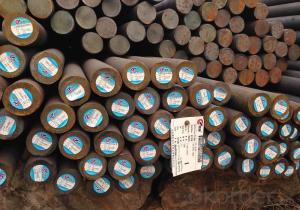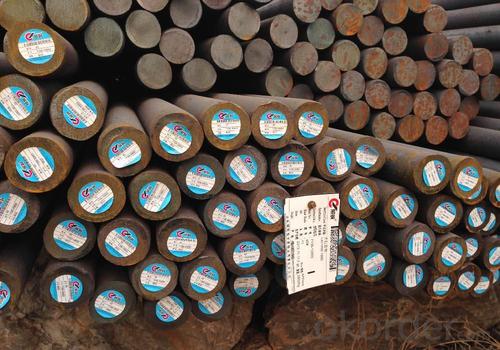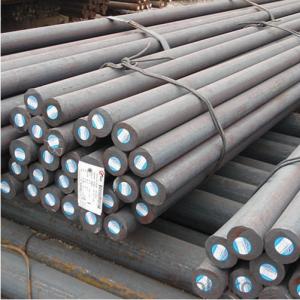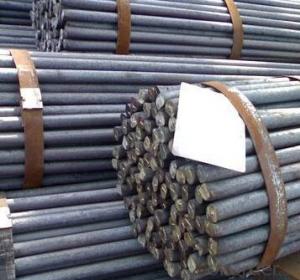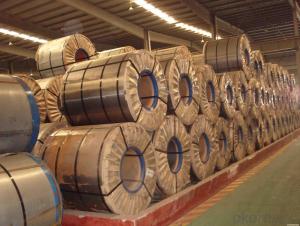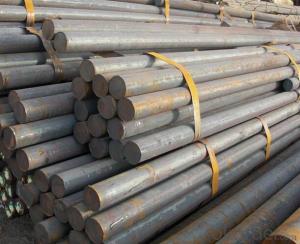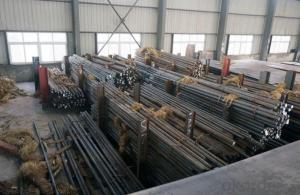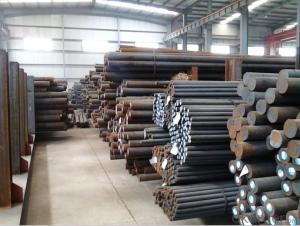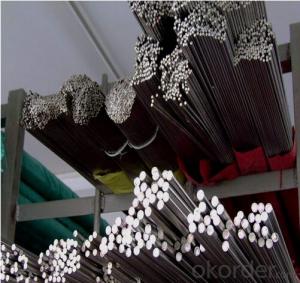Special Steel 42CrMo/1.7225/4140 High Carbon Steel
- Loading Port:
- China main port
- Payment Terms:
- TT OR LC
- Min Order Qty:
- 25 m.t.
- Supply Capability:
- 10000 m.t./month
OKorder Service Pledge
OKorder Financial Service
You Might Also Like
Specification
Chemical Composition(%)
| C | Si | Mn | Cr | Mo | Ni | P | S |
| 0.38-0.45 | 0.17-0.37 | 0.50-0.80 | 0.90-1.20 | 0.15-0.25 | ≤0.030 | ≤0.030 | ≤0.030 |
Standard
| GB | AISI | DIN | JIS | ISO |
| 42CrMo | 4140 | 42CrMo4 | SCM440 | 42CrMo4 |
Available Size
| Rolled round bar | φ20-120mm × L |
| Forged round bar | φ130-195mm × L |
Heat Treatment
| Item | Temperature℃ | Hardness |
| quenching | 840-880 | HRC32-34 |
| tempering | 580 | |
| quenching | 900 | HRC54-60 |
| tempering | 150-180 |
Characterstics
| The steel with high strength and toughness, hardenability is better also | |||||||
| After conditioning treatment quenching deformation of small | |||||||
| high fatigue limit and repeated impact resistance |
Applications
The steel is suitable for manufacturing requires a certain strength and toughness of large and medium-sized plastic mold
Product show:

Workshop show:

FAQ:
1, Your advantages?
professional products inquiry, products knowledge train (for agents), smooth goods delivery, excellent customer solution proposale
2, Test & Certificate?
SGS test is available, customer inspection before shipping is welcome, third party inspection is no problem
3, Payment Terms?
30% TT as deposit and 70% before delivery.
Irrevocable L/C at sight.
4, Trading Terms?
EXW, FOB, CIF, FFR, CNF
5, After-sale Service?
We provides the services and support you need for every step of our cooperation. We're the business partner you can trust.
For any problem, please kindly contact us at any your convenient time.
We'll reply you in our first priority within 24 hours.
- Q: How is special steel used in the aerospace industry?
- Special steel is used in the aerospace industry for various applications due to its exceptional strength, durability, and resistance to extreme temperatures. It is commonly utilized in the manufacturing of aircraft structures, engine components, landing gear, and fasteners. The high strength-to-weight ratio of special steel enables the construction of lightweight yet robust parts, contributing to improved fuel efficiency and aircraft performance. Additionally, its ability to withstand harsh environmental conditions and maintain structural integrity makes it indispensable for ensuring the safety and reliability of aerospace systems.
- Q: What are the different machining techniques used for special steel?
- Some of the different machining techniques used for special steel include turning, milling, drilling, grinding, and honing. These techniques are used to shape and finish the special steel according to specific requirements and tolerances. Each technique has its own advantages and is chosen based on factors such as the type of special steel, desired dimensions, surface finish, and the complexity of the part being machined.
- Q: How does special steel perform in high-temperature fatigue?
- Special steel is known for its exceptional performance in high-temperature fatigue conditions. When subjected to elevated temperatures, special steel exhibits properties such as high strength, excellent resistance to creep, and superior thermal stability. These characteristics make it highly reliable and capable of withstanding prolonged exposure to extreme temperatures without significant degradation in performance. One of the reasons for special steel's exceptional performance in high-temperature fatigue is its unique composition. It typically contains alloying elements such as chromium, molybdenum, and vanadium, which enhance its high-temperature strength and resistance to thermal fatigue. These alloying elements form stable carbides and nitrides that help retain the material's structural integrity even under extreme heat and cyclic loading. Furthermore, special steel undergoes specialized heat treatment processes, such as quenching and tempering, to further improve its high-temperature fatigue properties. These treatments enhance the material's microstructure, resulting in increased strength, toughness, and resistance to thermal fatigue. In high-temperature fatigue conditions, special steel demonstrates excellent fatigue strength and durability, even when subjected to cyclic loading at elevated temperatures. Its high-temperature fatigue limit is significantly higher than that of regular steel, allowing it to withstand repeated stress and strain without experiencing premature failure. This makes special steel an ideal choice for applications that involve high-temperature environments, such as gas turbines, heat exchangers, and aerospace components. In conclusion, special steel performs exceptionally well in high-temperature fatigue conditions due to its unique composition, specialized heat treatment processes, and superior mechanical properties. Its high strength, resistance to creep, and thermal stability make it a reliable and durable material for applications that require prolonged exposure to extreme temperatures.
- Q: What are the safety measures taken during the production of special steel?
- During the production of special steel, several safety measures are taken to ensure the wellbeing of workers and to minimize potential hazards. These safety measures include: 1. Personal Protective Equipment (PPE): All workers involved in the production of special steel are required to wear appropriate PPE, such as safety helmets, goggles, gloves, and protective clothing. This helps protect them from potential injuries, burns, or exposure to hazardous materials. 2. Training and Education: Workers undergo thorough training and education on safe working practices and procedures. They learn about the potential hazards associated with the production of special steel and are trained on how to handle equipment and materials safely. 3. Risk Assessments: Regular risk assessments are conducted to identify potential hazards and assess the level of risk associated with each task. This allows for the implementation of control measures to mitigate risks and prevent accidents. 4. Machinery and Equipment Safety: All machinery and equipment used in the production process are properly maintained and regularly inspected to ensure they are in good working condition. Safety features, such as emergency stop buttons and guards, are in place to prevent accidents and injuries. 5. Ventilation and Exhaust Systems: Special steel production often involves high temperatures and the use of chemicals that may release harmful fumes or gases. Proper ventilation and exhaust systems are installed to remove these pollutants from the work environment, ensuring a safe and healthy atmosphere for workers. 6. Fire Prevention: Fire prevention measures, such as the installation of fire alarms, extinguishers, and sprinkler systems, are implemented to minimize the risk of fire accidents. Workers are also trained on fire safety protocols and evacuation procedures. 7. Emergency Response Plans: Comprehensive emergency response plans are developed and communicated to all workers. These plans outline procedures to be followed in case of accidents, fires, or other emergencies, ensuring a prompt and organized response. 8. Regular Safety Inspections: Regular inspections are conducted by safety professionals to identify any potential safety hazards or non-compliance with safety protocols. Any issues or deficiencies are promptly addressed to maintain a safe working environment. By implementing these safety measures, the production of special steel can be carried out in a controlled and safe manner, protecting the workers and minimizing the risk of accidents or injuries.
- Q: What is the role of carbon in special steel?
- Carbon plays a crucial role in special steel as it significantly influences its properties and performance. Special steel refers to a category of steel that is specifically engineered to exhibit exceptional characteristics, such as high strength, hardness, wear resistance, or corrosion resistance. Carbon is one of the main alloying elements in special steel, and its content determines many of these desired properties. Firstly, carbon is responsible for increasing the strength and hardness of special steel. As carbon is added to the iron matrix, it forms iron carbides, which are extremely hard and provide structural integrity to the steel. The higher the carbon content, the greater the hardness and strength of the steel. This makes special steel suitable for applications requiring high toughness, durability, and resistance to deformation, such as in the manufacturing of tools, dies, and industrial machinery components. Secondly, carbon contributes to the wear resistance of special steel. The presence of carbon enhances the steel's ability to resist abrasion and withstand extreme conditions. This is particularly important in industries like mining, construction, and oil and gas, where components are subjected to intense wear and friction. Furthermore, carbon also plays a crucial role in determining the machinability and weldability of special steel. The carbon content affects the steel's response to heat treatment, making it easier or harder to machine or weld. The right balance of carbon content is essential to ensure that special steel can be easily worked on and fabricated into complex shapes without compromising its properties. Lastly, carbon influences the corrosion resistance of special steel. While steel is generally prone to corrosion, the addition of certain amounts of carbon can enhance its resistance to rusting and other forms of corrosion. This is particularly important in applications where the steel is exposed to harsh environments, such as marine or chemical industries. In summary, carbon plays a vital role in special steel by increasing its strength, hardness, wear resistance, machinability, weldability, and corrosion resistance. The precise amount of carbon added to the steel is carefully controlled to achieve the desired properties for specific applications, making special steel a highly versatile and sought-after material in various industries.
- Q: How does special steel contribute to the corrosion resistance of products?
- Special steel contributes to the corrosion resistance of products by incorporating specific alloying elements that enhance its ability to withstand the effects of corrosion. These alloying elements, such as chromium and nickel, form a protective layer on the surface of the steel, known as a passive film. This passive film acts as a barrier, preventing oxygen and moisture from reaching the underlying metal, thus reducing the likelihood of corrosion. The high levels of chromium in special steel, for example, enable the formation of a dense and stable chromium oxide layer on the surface. This layer acts as a physical barrier, preventing the diffusion of corrosive agents and inhibiting the formation of rust. Additionally, the presence of nickel in the alloy further enhances the corrosion resistance of the steel by promoting the formation of a more uniform and adherent passive film. Moreover, special steel can be specially treated or processed to enhance its corrosion resistance. Techniques such as heat treatment and surface coating can modify the structure and composition of the steel, promoting the formation of more stable passive films and reducing the susceptibility to corrosion. These treatments also help to improve the mechanical properties of the steel, making it more durable and resistant to external factors that may lead to corrosion. In summary, the use of special steel in various products contributes to their corrosion resistance by incorporating alloying elements and employing specific treatments that promote the formation of protective passive films. This, in turn, prolongs the lifespan of the products and ensures their performance and integrity, even in harsh and corrosive environments.
- Q: What are the different non-destructive evaluation techniques used for special steel?
- Some different non-destructive evaluation techniques used for special steel include ultrasonic testing, magnetic particle inspection, dye penetrant inspection, eddy current testing, and radiographic testing. These methods allow for the detection of internal and surface defects in the steel without causing any damage to the material.
- Q: How does special steel contribute to the manufacturing of aerospace components?
- Special steel plays a vital role in the manufacturing of aerospace components due to its unique properties and characteristics. Its exceptional strength, durability, and resistance to extreme temperatures and corrosion make it an ideal material for various applications in the aerospace industry. One of the main contributions of special steel to aerospace manufacturing is its ability to withstand high stress and pressure. Aerospace components, such as turbine blades, landing gear, and structural supports, are subjected to tremendous forces during flight. Special steel's strength and toughness allow these components to endure these forces without failure, ensuring the safety and reliability of the aircraft. Additionally, special steel's resistance to extreme temperatures is crucial in the aerospace industry. Aircraft engines, for example, operate at extremely high temperatures, and special steel alloys, such as those containing nickel or cobalt, are used to manufacture components like turbine discs and combustion chambers. These alloys can withstand the intense heat and prevent deformation or failure, ensuring optimal engine performance and efficiency. Furthermore, special steel's resistance to corrosion is essential for aerospace applications. Aircraft are constantly exposed to harsh environmental conditions, including moisture, chemicals, and saltwater. Special steel alloys, such as stainless steel, are highly resistant to corrosion, preventing degradation and maintaining the structural integrity of aerospace components over time. This is particularly important for critical parts like fuel tanks, hydraulic systems, and airframe structures. In conclusion, special steel significantly contributes to the manufacturing of aerospace components by providing strength, durability, resistance to extreme temperatures, and corrosion resistance. Its unique properties ensure the safety, reliability, and longevity of aerospace systems, making it an indispensable material in the aerospace industry.
- Q: How does the hardness of special steel affect its machinability?
- The hardness of special steel has a direct impact on its machinability. Generally, as the hardness of steel increases, its machinability decreases. Harder steel is more difficult to cut, shape, and form due to its increased resistance to deformation. Consequently, machining operations, such as drilling, milling, or turning, become more challenging and require specialized tools and techniques to achieve the desired results.
- Q: What are the different methods for tempering special steel?
- There are several different methods for tempering special steel, including air tempering, oil tempering, water tempering, and salt bath tempering. Air tempering involves heating the steel to a specific temperature and then allowing it to cool in air. Oil tempering involves heating the steel to a specific temperature and then quenching it in oil. Water tempering is a similar process, but the steel is quenched in water instead. Salt bath tempering involves heating the steel in a molten salt bath to achieve the desired tempering temperature. Each method has its own advantages and is chosen based on the specific properties and requirements of the steel being tempered.
Send your message to us
Special Steel 42CrMo/1.7225/4140 High Carbon Steel
- Loading Port:
- China main port
- Payment Terms:
- TT OR LC
- Min Order Qty:
- 25 m.t.
- Supply Capability:
- 10000 m.t./month
OKorder Service Pledge
OKorder Financial Service
Similar products
Hot products
Hot Searches
Related keywords
